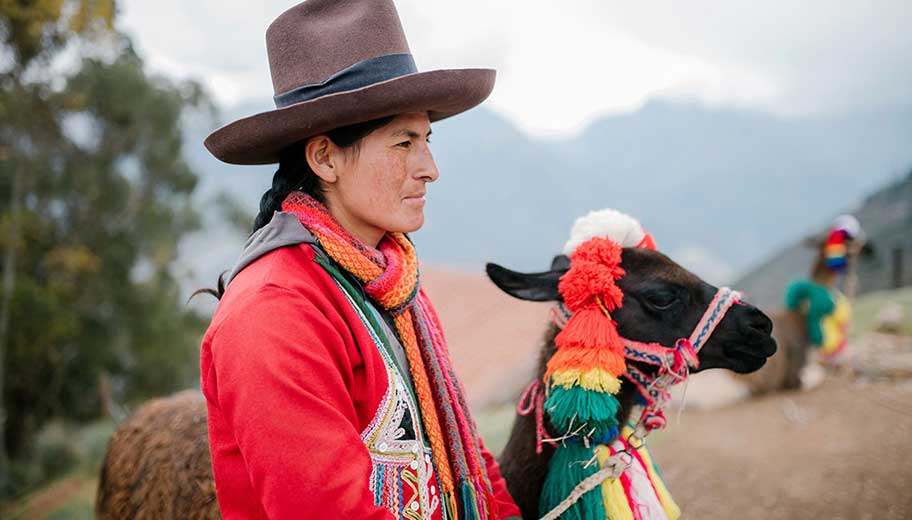
Here you are, my little daughter, the one I’ve been waiting for, the one I dreamed of, my necklace of fine stones, my quetzal plumage, my human form, the one born of me. You are my blood, my color, in you is my image.
Laura Esquivel (2005) Malinche.
The women who live in the rural communities of the indigenous peoples fulfil functions of great importance in the life cycle of their population. They participate in agricultural activities, and animal husbandry, are cooks, weavers, merchants, healers, midwives, mothers, and wives and help organize all the traditional religious ceremonies that include funerals and subsequent rituals.
However, despite the productive activities they carry out, the majority live in poverty, in addition to suffering discrimination due to their indigenous status, added to the submission that patriarchal societies exercise over them for being women and where violence is added.
For this reason, since September 5, 1983, the International Day of Indigenous Women is celebrated and it is recognized, as well as it’s legacy. This first event took place in Bolivia, where the social movements of the Americas were remembered and tribute was paid to Bartolina Sisa, a woman from the Aimara people who organized a rebellion against European colonial domination in 1782. For that reason, she was captured, imprisoned, abused and executed. According to the chronicles, she is admired as a brave and unwavering woman.
Bartolina has represented a large number of women throughout history, but despite her efforts to improve their situation, the real action is needed at the government level and in political programs. The ONU has proposed that on this #IndigenousWomen’sDay 2022, the role of women in the preservation and transmission of traditional knowledge be recognized.
From their childhood, they have limited access to formal education, but they acquire in-depth knowledge from their families in various fields. Forced by the need to provide themselves with economic resources, they are selected by their grandmothers or mothers to be cooks according to their traditions, this implies carrying out agricultural work from early in the day, harvesting, then the process of creating food and the preservation of recipes.
They are aware of the agricultural cycles related to astronomy and climate variations, thereby fulfilling religious functions of rituals associated with the production of various local crops. An example of this is that traditional Mexican cuisine was declared an Intangible Cultural Heritage of Humanity in 2010.
Other women receive a call that occurs during a dream or in the course of a high fever illness or by the use of sacred plants or psychotropics through which they enter into ecstasy and then they know that they will be doctors, midwives or healers of various diseases. . They then continue their training with the most experienced women in the community and use herbal or natural medicine. The OMS has recognized their work as a “complete health system” because, in the case of midwives, they practice accompaniment during pregnancy, childbirth, puerperium and in the care of the newborn.
They stand out as spiritual guides and exceptional interpreters of the culture and ideology of the group until the end of the lives of the people around them, and then they participate in the organization of funerals. They are the ones in charge of spiritually accompanying the dying, preparing them for physical death and their transition to a new life. They wash the bodies and can prepare them with some type of conservation for the wakes that take place in the houses of the deceased. They receive the people of the town who accompany the deceased and prepare abundant food to offer during the mourning.
Visitations at home are of great importance because they help to close the cycle that began many times when you were born in that same place and, according to tradition, contribute to death in peace and tranquillity. This custom is preserved even outside these communities.
At the end of the burials, the women will be in charge of preparing offerings and various rituals around the constant spiritual presence in the life of those populations. According to ancient beliefs, the care of the soul contributes to the deceased having a rest in the world of the dead, otherwise, he will wander restlessly in the earthly world of the living.
The purpose of recognizing indigenous women is to give visibility to the importance they have had throughout the history of native peoples and to observe that, however, they currently live in conditions of limited resources and at the mercy of phenomena such as those of climate change. climate, which affects both agricultural cycles, as well as their economy and their health. In addition to this, they are often forced to migrate to the cities and work in low-paid jobs without access to housing or basic services.
Convention 169 of the International Labor Organization is an instrument through which governments are invited to give effect to the social rights of indigenous peoples and give special attention to indigenous women, as well as complete respect for their culture. In the Americas, there are more than 1,000 recognized people and 50% of them are women.
At Del Pueblo Funeral Home, by making this account of the similar activities that women from all over the Americas have in common, we propose to eliminate all forms of discrimination and respect their right not to be assimilated or forced to accept alien cultural practices that threaten their own cultural identity, as well as defend their right to preserve their customs and traditions. We believe that colonialism was a practice of the past that viewed indigenous women as inferior, and we aspire to a fully inclusive current society, that is why we remind you that we make the most difficult moments easy.
